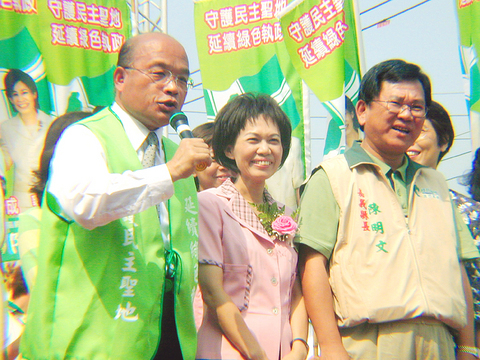The "new Democratic Progressive Party (DPP) movement" faced an early death after DPP Chairman Su Tseng-chang (蘇貞昌) convened party heavyweights on Saturday night for talks on recent controversies, and agreed that the movement should be silenced forever.
In the wake of flak from President Chen Shui-bian (陳水扁) over the new DPP movement, which advocates self-criticism and reforms, Su on Saturday convened an urgent meeting of party members from each faction to address recent quarrels among them.
Those who attended the meeting included Gao Jyh-peng (高志鵬), secretary-general of the Justice Alliance (正義連線), Chiu Chuei-chen (邱垂貞), chief of the Welfare State Alliance (福利國連線), Chen Sheng-hung (陳勝宏), convener of the Green Alliance (綠色連線), Tuan Yi-kang (段宜康), convener of the New Tide (新潮流) faction and other party higher-ups, including legislative caucus whips William Lai (賴清德) and Jao Yung-ching (趙永清), DPP Legislators Lee Wen-chung (李文忠) and Ker Chien-ming (柯建銘), and DPP Secretary-General Lee Yi-yang (李逸洋).

PHOTO: CNA
After about two hours of discussion, Su held a news conference at about 10pm and announced that a consensus had been reached on two points.
First, the DPP will fully support the six reforms pledged by the president during his National Day speech and the legislative caucus will propose concrete reforms with the administrative departments of the Executive Yuan. Second, the legislative caucus will establish a negotiation and communication mechanism to help carry out reforms, according to Su.
"Today's consensus is that the DPP will stick to reforms. And reforms will not influence consolidation. Our consolidation is for the sake of reforms," Su said on Saturday night.
Meanwhile, party officials also discussed the controversial new DPP movement, which has ignited internal feuds between the party's New Tide faction and other factions. Officials agreed that the factions should call a truce and never bring up the term "the new DPP movement" again.
Additionally, the airing of criticisms or rumors through the press is also prohibited, Su said.
Su added that he supported the spirit of the new DPP movement, but the title seemed inappropriate.
"There is no problem of the new DPP or the old DPP. There is only a problem of reforming or not." Su said. "We will not allow internal attacks among factions after this."
Other participants voiced similar views, saying that little communication had occurred before the movement had been proposed, and that its advocates had offered few practical measures for its implementation, which only hurt the DPP's image and unity.
In the face of criticism from Su and other party members, Tuan, one of the movement's advocates and also the convener of the New Tide faction, did not respond directly to it, saying only that Su's statement was the basis for any questions about the new DPP movement.

A strong continental cold air mass is to bring pollutants to Taiwan from tomorrow, the Ministry of Environment said today, as it issued an “orange” air quality alert for most of the country. All of Taiwan except for Hualien and Taitung counties is to be under an “orange” air quality alert tomorrow, indicating air quality that is unhealthy for sensitive groups. In China, areas from Shandong to Shanghai have been enveloped in haze since Saturday, the ministry said in a news release. Yesterday, hourly concentrations of PM2.5 in these areas ranged from 65 to 160 micrograms per cubic meter (mg/m³), and pollutants were

Taiwan’s armed forces have established response protocols for a wide range of sudden contingencies, including the “Wan Chun Plan” to protect the head of state, the Ministry of Defense (MND) said today. After US President Donald Trump on Saturday launched a series of airstrikes in Venezuela and kidnapped Venezuelan President Nicolas Maduro, concerns have been raised as to whether China would launch a similar “decapitation strike” on Taiwan. The armed forces regularly coordinate with relevant agencies and practice drills to ensure preparedness for a wide range of scenarios, Vice Minister of National Defense Hsu Szu-chien (徐斯儉) told reporters before a

EVA Airways on Saturday said that it had suspended a pilot and opened an investigation after he allegedly lost his temper and punched the first officer several times as their plane was taxiing before takeoff at Los Angeles International Airport. According to a report published on Thursday by The Reporter, the incident occurred after the flight’s Malaysian first officer tried to warn the Taiwanese pilot, surnamed Wen (文), that he was taxiing faster than the speed limit of 30 knots (55.6kph). After alerting the pilot several times without response, the first officer manually applied the brakes in accordance with standard operating

Japanese Councilor Hei Seki (石平) on Wednesday said that he plans to visit Taiwan, saying that would “prove that Taiwan is an independent country and does not belong to China.” Seki, a member of the Japan Innovation Party, was born in Chengdu in China’s Sichuan Province and became a naturalized Japanese in 2007. He was elected to the House of Concilors last year. His views on the Chinese Communist Party (CCP) — espoused in a series of books on politics and history — prompted Beijing to sanction him, including barring Seki from traveling to China. Seki wrote on X that he intends